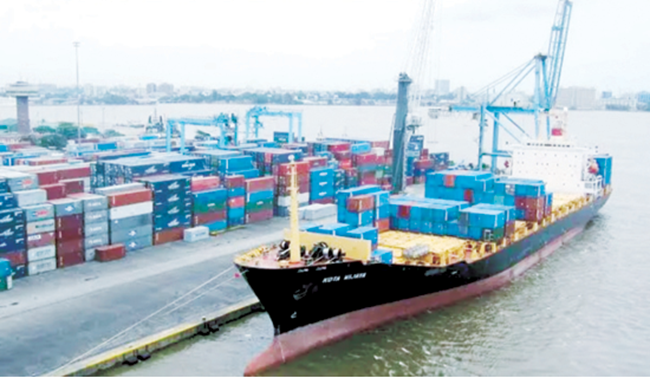
For years, many Nigerian cargoes exported abroad are often rejected due to the poor state and conditions most of them arrive their countries of destination. However, new trends indicate that Nigerian exporters are gradually finding a way around this rejection, writes TOLA ADENUBI.
The rejection of Nigerian exports cargoes abroad has cost many exporters billions of monies, leading to many going bankrupt or not bothering to go into the export business anymore.

For many of these rejected cargoes, findings have revealed that the fault doesn’t entirely come from the exporters but from the incessant delays that export cargoes go through at the nation’s ports.
Speaking with the Nigerian Tribune, an exporter, Mrs Folake Abimbola blamed the delays and the time wasted at the ports by many of the perishable export cargoes for many of the rejection.
According to Mrs Abimbola, “We hear of how many export cargoes that leave Nigeria get rejected at their countries of destination, but do we blame the exporters? No, because when the cargoes arrived at the ports, they arrived in good condition.
“Many of the cargoes that you hear were rejected abroad did not arrive at the Lagos Port already bad or smelling. When these cargoes arrive at the ports in Lagos, they usually arrive in very good conditions. However, what do you expect when an export cargo spends three to six months waiting at the port because different regulatory agencies raised “red flags” over them?
“The export procedure at the ports are not streamlined in a straight forward manner. The Nigerian Export Promotion Council (NEPC) has its own procedures, the Nigerian Ports Authority (NPA) also has the Export Processing Terminals (EPT’s) to guide export process. The National Agency for Food and Drug Administration and Control (NAFDAC) and the Standards Organisation of Nigeria (SON) have their own procedure too.
“So when these cargoes, mostly agricultural produce, arrive at the ports, the terminal operators who are supposed to pre-arrange these cargoes for shipment get confused when different government agencies raise different Red Flags just because the cargo didn’t pass through their own export procedure.
“At times, cargoes spend six months at the ports because government agencies with overlapping functions governing export business fail to agree. In most cases, these cargoes are perishable food items, how do you expect them not to be rejected abroad?
“There is no way such cargoes won’t get rejected because it has spent too much time waiting inside the port to get the necessary clearance from different government agencies, and by the time it’s being shipped for export, the agricultural produce are already deteriorating. In this situation, do you blame the exporters?
“We need to streamline our processes. There are so many government agencies involved in export business and they don’t seem to be working together. Imagine NAFDAC raising Red flags over an export cargo that left the Export Processing Terminals (EPT) set up by the NPA? Sometimes, if it’s not NAFDAC, it will be SON raising red flags. Are these agencies not domiciled at the Export Processing Terminals set up by the NPA?”
New export pattern
Due to frustration and fear of rejection of their produce in Europe and other countries, Nigerian exporters are beginning to adopt the ‘country of origin’ and ‘labeling’ of neigbouring West African countries like Ghana, Benin Republic and Togo to ship their commodities abroad.
The decision to go elsewhere is geared towards avoiding further losses they have been incurring for years due to wrong perception about the produce that emanates from Nigeria.
Speaking with the Nigerian Tribune, another exporter, Bassey Udom explained that, “Majority of the produce, especially yams that pass-through Ghana to Europe are from Nigeria. When this same produce goes through Nigerian ports, it is rejected abroad due to negative labelling and perceptions placed on Nigerian export by their prospective buyers.
“This perception has been built over the years due to the delays export cargoes go through at our ports. So, its always a case of ‘can anything good come out of Nigeria’?
“So, to avoid further losses, export cargoes like agricultural produce and edibles are now being labelled as originating from Ghana and other West African countries. Many of our colleagues take their goods to these countries via road haulage and then export them abroad from there.
“This has reduced losses because when the goods arrive the destination country, it is not received as an export cargo from Nigeria but as an export cargo from Ghana or Benin Republic. Thus, there is less scrutiny or rejection of the cargo.”
Also speaking on the development, the Chief Executive Officer of the Centre for the Promotion of Private Enterprise (CPPE), Dr Muda Yusuf, said what Nigeria needs to first do is to earn the trust and confidence of buyers of Nigerian agricultural produce abroad, particularly their regulatory authorities.
“You know this issue of Nigerian exporters going to Ghana, Togo and other ports to get label of origin arose from the issues around the quality of some of our food products. There was a time this issue affected beans and other produce.
“So the onus is on us to ensure that we get it right with the quality and the packaging because these people also have their own standards. If those things can go from Ghana to those countries, why can’t they also go from Nigeria? It is a question of what we do to meet those people’s standards.
“Our processes here need to be a lot more simplified to make it easier for people to export because these are perishable items.
“You know when you pack yams and you go and stay in one loading bay, before getting to the port, it’s already getting to four weeks, these things can go bad. So internally, there is a lot of work you need to do around issues of standard, packaging, processes and logistics of delivery of these export products to the vessel at the port. Those are the things I think we need to address,” Yusuf explained.







